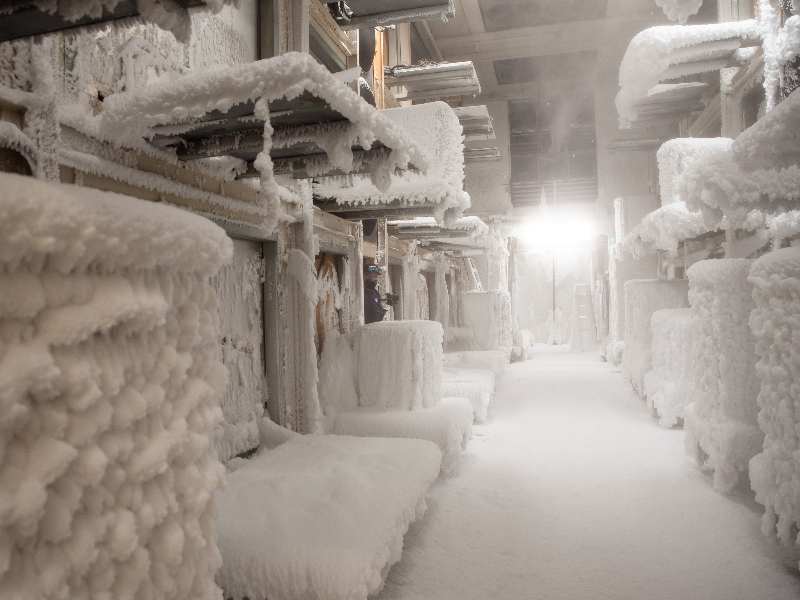Cold climate heat pump tech is being developed by Trane Technologies in the US to ensure high-efficiency heating in freezing temperatures.
 The Systems Extreme Environmental Test (SEET) room at the Tyler, Texas Trane manufacturing facility. It allows technicians and engineers to put heat pumps and AC systems through thousands of hours of continuous testing – while measuring and managing quality and performance. The foundation for Trane’s Cold Climate Heat Pump challenge prototype was tested in the SEET room, ahead of outperforming tests at the US DOE’s Oak Ridge National Lab Facility. Photo: Business Wire.
The Systems Extreme Environmental Test (SEET) room at the Tyler, Texas Trane manufacturing facility. It allows technicians and engineers to put heat pumps and AC systems through thousands of hours of continuous testing – while measuring and managing quality and performance. The foundation for Trane’s Cold Climate Heat Pump challenge prototype was tested in the SEET room, ahead of outperforming tests at the US DOE’s Oak Ridge National Lab Facility. Photo: Business Wire.
Trane Technologies, which manufactures heating and ventilation systems, surpassed the DOE (Department of Energy)’s requirements for the Residential Cold Climate Heat Pump (CCHP) Challenge for high-efficiency heating in freezing temperatures.
After successful laboratory tests in extremely cold temperatures, the Trane cold climate heat pump will begin field trials this month.
When tested at the DOE’s lab, Trane’s CCHP prototype performed in temperatures as low as -23°F (-30.6°C), surpassing the mandatory -20°F (-28.9°C) DOE requirement.
“When tested at the Oak Ridge National Lab Facility, our prototype pushed the limits of the testing with high performance even as temperatures moved beyond the trial scope. To stop this Trane unit, they had to manually cut the power,” said Katie Davis, vice president of engineering and technology, Residential HVAC, Trane Technologies.
“We are excited to conduct field testing with this heat pump and keep families warm while supporting a more sustainable future.”
DOE’s CCHP challenge
The CCHP Challenge was launched by the DOE as part of the E3 initiative (Energy, Emission and Equity Initiatives and aims to advance the performance of CCHP technologies above the performance of current best-in-class heat pump tech.
The performance specifications were developed based on a review of current CCHP performance data from the Northeast Energy Efficiency Partnerships database and discussions with manufacturers on technology opportunities and limitations.
The Challenge is currently focused on residential, centrally ducted, electric-only heat pumps. The Challenge has two segments: one for a CCHP optimised for 5°F (-15°C) operation (otherwise known as the 5°F challenge) and the other for a CCHP optimised for -15°F (-26°C) operation (the -15°F challenge). Manufacturers can choose to participate in either one or both segments of the Challenge.
The performance specifications would exceed current products on the market today and will aim to meet a 2024 commercialisation timeline.
The Challenge also has requirements for employing a low GWP (Global Warming Potential) refrigerant, providing grid interactivity and incorporating electric heat staging.
Jason Bingham, president of residential HVAC, Trane Technologies, said on the tech: “We’re excited to move to the next phase of the DOE challenge.
“As more and more homeowners choose sustainable solutions like heat pumps, we look forward to helping them take advantage of new clean energy tax credits and rebates available through the Inflation Reduction Act.”
